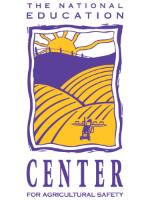Thursday, November 9, 2:00-5:00 PM at National Education Center for Agricultural Safety, Peosta, Iowa
This skill building workshop will include introduction of tools that can assist farmers and ranchers in preparing for emergencies, discussion about content areas that still need development and an update on hands-on training available through NECAS. There is no cost to attend the workshop. There are two ways to register:
1.
If you haven’t already registered and would like to attend the MRASH Conference, November 8-9, including the workshop:
2.
If you wish to attend ONLY the post-conference workshop on November 9:
Target Audience:
- Firefighters
- Emergency Responders and Emergency Management Personnel
- Farmers
- Extension and Farm Service Providers
- Agribusiness
- MRASH Conference Participants (included in conference registration)
Agenda:
- Disaster PrepWise is a program that uses an all-hazards approach to conduct assessments and prepare a household for emergencies (natural disasters, fires, etc). Presented by Nick Ostrem, Project Coordinator.
- Personal Household Assessment
- Personal Emergency Network
- Emergency Information/Documents
- Medication/Medical supplies
- Emergency Supply Kits
- Supplemental information including pets, support animals, livestock
- Preview of new project working with caregivers for individuals with dementia
- Farm MAPPER is an interactive web-based prototype that provides emergency responders onsite information about hazards, resources and physical layouts of agricultural operations. Presented by Jakob Hanschu, MA, National Farm Medicine Center
- Displays map icons representing items important in emergency events such as hazards, access points, water sources, etc.
- Enables uploading of images and information related to specific farms, e.g., a picture of a piece of machinery and instructions on how to shut it off.
- Once set up, the information is accessible to emergency responders in the fire station or en route by smartphone/tablet, assisting responders to efficiently and safely respond to farm emergencies. Farm maps can also be printed out.
- Password-protected data only available to firefighter/EMS personnel that originally mapped the farm.
- Next Steps Discussion:
- Adapting these and other tools for farm use
- What components or features are still needed
- How to organize promotion and use of these tools in rural communities
- National Education Center for Agricultural Safety Tour of resources and training topics available from NECAS
- Confined Spaces: Grain Bin Entry and Rescue
- Confined Spaces: Manure Pit Rescue
- Anhydrous Ammonia
- Prevention of Grain Dust Explosions
Learning Objectives:
Following this workshop, participants will be able to:
- Understand tools available in the PrepWise program to customize an emergency preparedness plan for a rural household.
- Understand the benefits and operation of the revised Farm MAPPER system to organize information needed to respond during an emergency.
- Understand training tools available to train farmers and rescuers on emergencies involving grain bins, manure pits, anhydrous ammonia, and dust explosions.
- Identify additional tools the agricultural community needs to optimize emergency planning
 Directions to National Education Center for Agricultural Safety (NECAS):
Directions to National Education Center for Agricultural Safety (NECAS):
8342 NICC Drive, Peosta, IA 52068
563.557.0354
NECAS is located on the campus of Northeast Iowa Community College (NICC) in Peosta. It is just north of US Highway 20, about 12 miles from downtown Dubuque.



